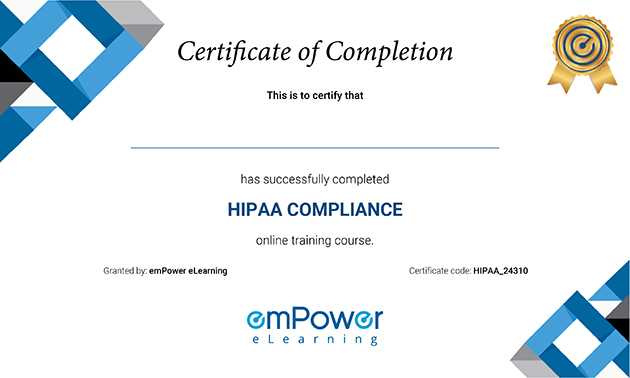HIPAA Security Rule Awareness training
Train yourself to comply with the HIPAA Security rule. Use this training to learn about the safeguards that you need to follow.

Our Client

































What is Security Rule
Complying with the Security Rule is deemed necessary under HIPAA, the healthcare law that governs the usage, storage, and sharing of protected health information in electronic format, ePHI. Under the law, every person and organization with access to electronic health information needs to guarantee its safety. This includes measures to protect the information’s confidentiality, integrity, and availability.
The security rule codifies the standards of protection you need to put in place to protect ePHI. This covers identifying and guarding against possible threats to the information. Along with this, you need to put safeguards against impermissible use and disclosure in place. And in case of a breach, you must be prepared to issue breach notifications to the affected individuals.
Designed to fulfill the mandatory training requirements set by HIPAA, the HIPAA Security Rule training covers
- What is the Security Rule
- General requirements
- Security standards that you need to follow
Beginning with a basic introduction to the Security rule, the course covers the major aspects of the Security rule, such as
- Administrative safeguards
- Physical safeguards
- Technical safeguards
By the end of the training, you’d develop a good understanding of what information you need to protect, and the do’s and don’ts of using health records in electronic format.
Course Description
| Category | Healthcare |
| Course Name | HIPAA Security Rule training for Professionals |
| Duration | 30 mins |
| Certificate Included | Yes |
| Languages | English |
| Course Type | Interactive online training |
| Narration | Yes |
| Format | LM-light, SCORM 1.2 |
| Supported Devices | Desktop/Laptop, Tablet, Phone |
| Last Updated | June 30, 2021 |
What you’ll learn
- What is the HIPAA Security rule, and why is it important to know about it?
- Objectives of the Security rule
- Who is covered under it
- What information is protected
- Safeguards that you need to put in place
Curriculum
- HIPAA Security Rule: Background
- Facts and Figures
- What is the Security Rule?
- What is protected by the Security Rule?
- Objectives of the Security Rule
- Who must Comply with the Security Rule?
- General Requirements and Structure of the security rule
- Administrative Safeguards
- Examples of Administrative Safeguards
- Physical Safeguards
- Examples of Physical Safeguards
- Technical Safeguards
- Examples of Technical Safeguards
- Flexibility in the Security Rule
Who Should Attend?
- Anyone who works in healthcare and has access to electronically protected health information.
- Healthcare workers
- Employees of healthcare providers
- Employees of Health plans, clearinghouses, and insurance companies
- Contractors and their employees
Why emPower
100s of customers
- 14+ Years of experience in working with small to large businesses from different industries
- 95% customer retention
Customer Experience
- 24x7 dedicated support and toll free number
- 99%+ guaranteed uptime
Extremely Cost-effective
- As low as $0.99/user/yr
- We will match or better the price of your current LMS
Effective Courses
- Each course is 20-40 min long to ensure engagement with quizzes and certificate
- SCORM 1.2 Compliant
Implementation
- No setup costs
- We deploy your customized solution in less than 48 hours
Our Achievements
Here you can review some statistics about our Education Center
Related Courses
Start Your Certification Course Today
To comply with the security rule, you need to put in place 3 types of safeguards – Administrative, physical, and security. Together, they can guarantee the safety of ePHI stored or used over your computers and servers.
In essence, the HIPAA security rule requires you to protect the electronic health information you come across during your work. This covers the integrity, confidentiality, and availability of the information.
The security rule requires all persons and organizations with access to ePHI to comply with the standards set by HIPAA. This includes healthcare organizations, health plans, clearing houses, insurance agencies, and contractors.
Whereas the HIPAA privacy rule concerns itself with how you use, store, or disclose protected health information, the security rule requires you to put in place reasonable measures to safeguard electronic health information.

